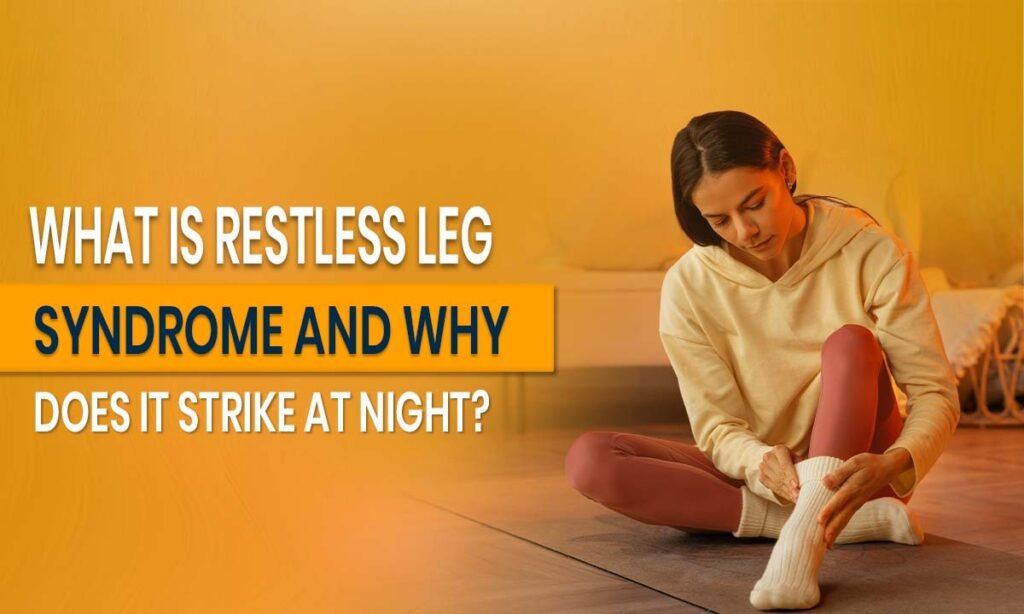
Restless Leg Syndrome (RLS) is a condition that affects the legs, causing an irresistible urge to move them. It often strikes when you’re trying to rest, and it can leave you tossing and turning at night. People with RLS experience a sensation of discomfort, often described as creeping, crawling, or tingling in the legs, particularly when they lie down to sleep. It’s more than just an annoying feeling—it disrupts sleep and can impact your overall quality of life. In this article, we will guide you through understanding what RLS is, its symptoms, causes, and effective treatments.
Today, we’ll also cover how you can stop restless legs immediately and provide you with solutions backed by the expertise of Athena Luxus, a leader in mental health and wellness.
Restless Leg Syndrome Symptoms: How to Recognize the Early Signs
The symptoms of restless leg syndrome are often subtle at first but can worsen over time if left untreated. Here are the primary signs to look out for:
- Tingling or Crawling Sensations: You may feel like something is crawling under your skin, especially when sitting or lying down.
- Urgency to Move Your Legs: Moving your legs or stretching them temporarily relieves the discomfort, but it comes back as soon as you stop moving.
- Symptoms Worse at Night: One of the hallmark features of RLS is that it often gets worse when you try to rest, particularly in the evening or at night.
- Sleep Disruptions: Due to the discomfort, it can be difficult to fall asleep or stay asleep, leading to significant fatigue the next day.
If any of these symptoms sound familiar, it might be time to consult a healthcare professional to discuss restless leg syndrome treatment options.
Restless Leg Syndrome Causes: Is It Your Lifestyle or Something More?
Restless leg syndrome causes are still not completely understood, but there are several factors that can contribute to the condition:
- Genetics: If you have a family member with RLS, you’re more likely to develop it yourself.
- Iron Deficiency: Low iron levels are thought to play a role in RLS. Iron is essential for dopamine function, a neurotransmitter involved in movement control.
- Pregnancy: Hormonal changes during pregnancy can increase the likelihood of developing RLS.
- Chronic Diseases: Conditions like diabetes, kidney disease, and peripheral neuropathy are associated with an increased risk of RLS.
- Medications: Certain medications, such as antihistamines or antidepressants, may trigger or worsen RLS.
Adopting a healthy lifestyle that includes proper nutrition and physical activity can help alleviate restless leg syndrome symptoms and prevent worsening over time.
Why Restless Leg Syndrome Gets Worse During Sleep—The Hidden Connection
Have you ever wondered why restless leg syndrome during sleep feels so much worse? The reason lies in your body’s natural rhythms. At night, your body is more relaxed and less active. This stillness can amplify the sensations associated with RLS, making it harder to sleep. The brain activity that typically suppresses these sensations when you’re moving may also slow down during sleep, allowing the discomfort to become more prominent.
Moreover, as your muscles relax during sleep, they may become more sensitive to the signals sent by your nervous system, leading to an increased urge to move. This is why restless leg syndrome during sleep is a common complaint among those suffering from the condition.
How to Stop Restless Legs Immediately: Quick Fixes That Actually Help
If you’re looking for ways to stop restless legs immediately, here are a few quick remedies that may help:
- Stretching: Gently stretching your legs can help relieve the discomfort.
- Hot or Cold Compress: Alternating between hot and cold compresses can reduce the sensations.
- Movement: Walking or doing light exercises may help alleviate the urge to move your legs.
- Massage: A gentle leg massage can promote circulation and ease the discomfort.
These restless leg syndrome treatment techniques provide temporary relief, but it’s important to consult a healthcare provider for long-term management.
Best Restless Leg Syndrome Treatment Options Backed by Doctors
For those struggling with restless leg syndrome, seeking the best treatment options is crucial. Here are some effective restless leg syndrome treatments recommended by doctors:
- Medications: Doctors often prescribe medications like dopamine agonists (e.g., pramipexole), anticonvulsants, or iron supplements to treat RLS.
- Lifestyle Changes: Adjusting your daily habits, including regular exercise, improved sleep hygiene, and reducing caffeine and alcohol intake, can help reduce symptoms.
- Compression Devices: Some patients benefit from wearing compression stockings or leg wraps designed to help manage RLS.
Can Restless Leg Syndrome Be Cured? The Truth About Long-Term Relief
Restless leg syndrome may not have a complete cure, but it can be effectively managed. With the right restless leg syndrome medication, treatments, and lifestyle changes, people with RLS can experience long-term relief. It’s important to maintain regular checkups with your doctor to monitor your condition and adjust treatments as needed.
At Athena Luxus, we offer a holistic approach to restless leg syndrome treatment, combining medical treatments with therapy and lifestyle modifications. This comprehensive approach ensures that you not only manage symptoms but also improve your overall quality of life.
Is There a Restless Leg Syndrome Medicine Without Side Effects?
Many patients are concerned about the side effects of restless leg syndrome medication. The truth is, most medications come with potential side effects, but these vary from person to person. Common side effects of RLS medications include nausea, dizziness, or daytime drowsiness.
It’s essential to work with a doctor to find the right medication for you. If you’re concerned about side effects, alternative treatments such as lifestyle changes or physical therapies may also provide significant relief.
Restless Leg Syndrome Treatment Drugs: What Doctors Recommend Most
Doctors most commonly recommend these restless leg syndrome treatment drugs for managing the condition:
- Dopamine Agonists: These medications help stimulate dopamine in the brain and reduce symptoms.
- Iron Supplements: Low iron levels are linked to RLS, so supplementing iron may help alleviate symptoms.
- Anticonvulsants: These medications help calm nerve activity and can reduce RLS symptoms.
These drugs can provide significant relief, but it’s important to follow your doctor’s advice on dosage and usage.
Living with Restless Leg Syndrome: Tips for Better Sleep and Daily Comfort
Living with restless leg syndrome can be challenging, especially if you experience symptoms at night. Here are a few tips to improve your sleep and comfort:
- Establish a Routine: Go to bed and wake up at the same time every day to improve your sleep quality.
- Limit Stimulants: Avoid caffeine, nicotine, and alcohol, as they can trigger or worsen symptoms.
- Exercise Regularly: Engaging in physical activity during the day can reduce the severity of RLS symptoms.
Athena Luxus Approach to Restless Leg Syndrome: Innovation in Relief & Recovery
At Athena Luxus, we provide a multi-faceted approach to managing restless leg syndrome. Our team of experts combines medical treatments with behavioral therapy to ensure that you not only manage your symptoms but also work toward long-term recovery.
If you’re struggling with RLS or any related mental health issue, we’re here to help. Contact Athena Luxus for personalized treatment plans designed to help you regain control of your life and improve your overall well-being.
Conclusion
If you’re dealing with restless leg syndrome, don’t suffer in silence. At Athena Luxus, we offer a variety of treatments to help you manage your condition effectively. Whether you’re looking for restless leg syndrome treatment drugs or lifestyle strategies, we’ve got you covered. Book an appointment today and take the first step toward better health.
Patient Experiences
- Ananya Sharma: “I’ve been struggling with RLS for years. Athena Luxus’ holistic approach has been a game-changer. Their treatments gave me the relief I desperately needed.”
- Rahul Mehra: “I couldn’t sleep properly for months due to RLS. Thanks to Athena Luxus, I now follow a simple routine and take the right medication to manage my symptoms.”
- Priya Verma: “I was skeptical at first, but Athena Luxus truly helped me understand my condition. They gave me both medical and lifestyle strategies to manage my RLS.”
- Vinay Kapoor: “The personalized care I received at Athena Luxus made a huge difference in my life. My RLS symptoms are now much more manageable, and I’m finally able to get a good night’s sleep.”
Frequently Asked Questions
What is your body lacking when you have restless legs?
A lack of iron, dopamine, or other nutrients can contribute to RLS.
What is the root cause of restless leg syndrome?
Genetics, lifestyle factors, and underlying medical conditions can all be contributing factors.
Which treatment is best for restless leg syndrome?
The best treatment depends on your symptoms and underlying causes. Medications, lifestyle changes, and physical therapy are common treatments.
What does restless leg syndrome feel like?
It feels like an uncomfortable crawling or tingling sensation in the legs, often worse at night.
What is the root cause of restless leg syndrome?
RLS may be linked to iron deficiency, genetic factors, and certain medical conditions like diabetes.

